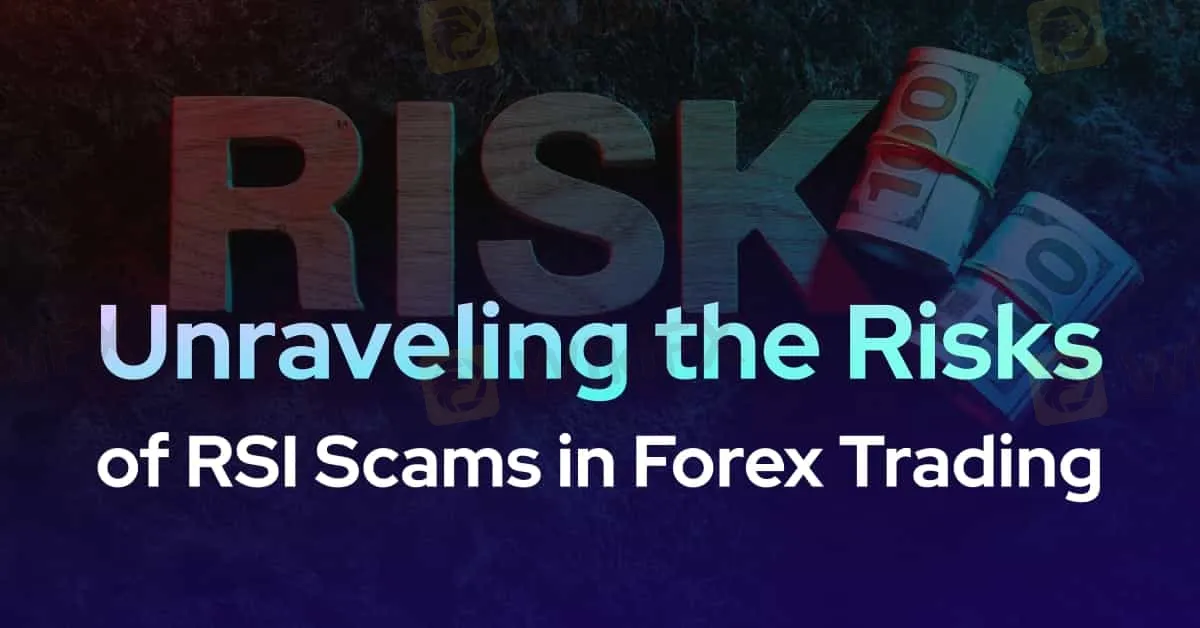简体中文
繁體中文
English
Pусский
日本語
ภาษาไทย
Tiếng Việt
Bahasa Indonesia
Español
हिन्दी
Filippiiniläinen
Français
Deutsch
Português
Türkçe
한국어
العربية
Unraveling the Risks of RSI Scams in Forex Trading
Abstract:The forex market, with its complexities and rapid fluctuations, attracts traders seeking effective tools to gauge market momentum. The Relative Strength Index (RSI), a popular momentum oscillator, is widely used for this purpose. However, amidst the legitimate applications of RSI, there is a growing concern about scams that exploit this indicator for deceptive practices.

The forex market, with its complexities and rapid fluctuations, attracts traders seeking effective tools to gauge market momentum. The Relative Strength Index (RSI), a popular momentum oscillator, is widely used for this purpose. However, amidst the legitimate applications of RSI, there is a growing concern about scams that exploit this indicator for deceptive practices.
Understanding the Role of RSI in Forex Trading:
The Relative Strength Index (RSI) is a momentum oscillator that measures the speed and change of price movements. Traders often use it to identify overbought and oversold conditions in the market, helping them anticipate potential trend reversals. While RSI is a valuable tool, scammers have found ways to misuse it, leading to deceptive practices that can harm unsuspecting traders.
Fake Signals and Misleading Readings:
One common tactic employed by fraudulent entities is the generation of fake signals using RSI. Scammers might manipulate RSI settings to produce artificial overbought or oversold readings, leading traders to make decisions based on false signals. This can result in significant financial losses for traders who rely solely on these manipulated RSI readings.
Exaggerated Success Rates:
Scammers often present exaggerated success rates associated with RSI-based trading strategies. They may claim to have discovered foolproof methods for consistently profiting from the market by interpreting RSI readings. Traders should approach such claims with skepticism, as consistently predicting market movements with such precision is challenging and may indicate deceptive practices.
Unregulated RSI-Based Trading Systems:
Fraudulent actors may promote unregulated RSI-based trading systems, claiming that these systems hold the key to guaranteed profits. Traders should exercise caution when considering such systems, as unregulated entities may lack transparency and oversight, posing a higher risk of engaging in deceptive practices.
Protecting Yourself from RSI Scams:
To safeguard against falling victim to RSI scams, traders should adopt a cautious and informed approach. Here are some key steps to protect yourself:
Educate Yourself:
Gain a thorough understanding of how RSI works and its applications in different market conditions. This knowledge will enable you to discern legitimate signals from potential scams.
Verify Performance in Real-Time:
Before committing to any RSI-based trading system, independently verify its performance in real-time market conditions. Be skeptical of systems that rely solely on historical data without transparent, ongoing results.
Diversify Analysis Techniques:
Avoid relying solely on RSI for trading decisions. Combine the use of RSI with other technical indicators and fundamental analysis to gain a more comprehensive view of the market.
WikiFX: Your Shield Against Deceptive Forex Practices
WikiFX, a prominent forex broker information and rating platform, stands as a reliable resource for traders seeking information about brokers, trading strategies, and indicators. The platform's commitment to transparency aligns with the goal of creating a safer and more secure trading environment for all participants.
By utilizing WikiFX's services, traders can access comprehensive information about brokers, including their regulatory status, customer reviews, and ratings. Armed with this knowledge, traders can make more informed decisions and protect themselves from falling prey to RSI scams and other deceptive practices.
In conclusion, while the RSI is a valuable tool in forex trading, traders must remain vigilant against scams that exploit this indicator. By staying informed, verifying performance, and leveraging resources like WikiFX, traders can protect themselves from deceptive practices and navigate the forex market with greater confidence.

Disclaimer:
The views in this article only represent the author's personal views, and do not constitute investment advice on this platform. This platform does not guarantee the accuracy, completeness and timeliness of the information in the article, and will not be liable for any loss caused by the use of or reliance on the information in the article.
Read more

Tradu Joins TradingView for Seamless CFD and Forex Trading
Tradu, a global trading platform, integrates with TradingView for seamless CFD and forex trading, offering transparency, tight spreads, and fast execution.

Protect Your Portfolio in the Storm | What Are Safe Haven Assets?
Gold surged to an all-time high on Tuesday, driven by renewed weakness in the US dollar, ongoing trade war tensions, and critical remarks from President Donald Trump aimed at the Federal Reserve. These factors fuelled strong demand for safe-haven assets, pushing bullion above US$3,485 an ounce for the first time. But what exactly are safe haven assets? Why is everyone raving about them?

SEC Warns of Love Scams and Pig Butchering Investment Schemes
SEC's new campaign warns about relationship investment scams, highlighting red flags, losses, and protective measures. Stay safe from "pig butchering" schemes.

WeTrade Secures CySEC License to Expand EU Trading Services
WeTrade secures a CySEC license, allowing EU-wide operations. The approval boosts services, partnerships, and trust across the global trading community.
WikiFX Broker
Latest News
FCA Issues Alerts Against Unauthorised and Clone Firms in the UK
Consob Orders Blackout of 9 Fraudulent Financial Websites
eXch Exchange to Shut Down on May 1 Following Laundering Allegations
How a Viral TikTok Scam Cost a Retiree Over RM300,000
FCA Proposes Simplifying Investment Cost Disclosure for Retail Investors
JT Capital Markets Review
Fresh Look, Same Trust – INGOT Brokers Rebrands its Website
Tradu Joins TradingView for Seamless CFD and Forex Trading
Japan Issues Urgent Warning on $700M Unauthorized Trades
Silver surges past $33—are you ready for what comes next?
Currency Calculator


